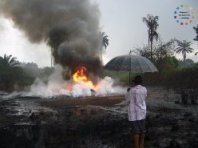Minorities and Natural Resources

The Hague, 21 April 2011
On 21 April 2011, IES participated in a pre-Earth Day-celebration at the Institute of Social Studies (ISS) in The Hague. The seminar, organized by the Unrepresented Nations and Peoples Organization (UNPO) and the Environment Committee of the ISS, focused on the human rights implications of natural resources exploitation.
Ms. Lisa Thomas of UNPO provided an excellent overview of general problems and potential solutions. She pointed out that minority groups suffer strongly from the exploitation of natural resources, through land and property violations, environmental degradation and human rights violations. She also explained the principle of ?free, prior and informed consent?, which can serve to promote the participation of local populations in resource development, thereby preventing many of these problems.
The plight of disenfranchised groups facing natural resource exploitation was then illustrated through three case studies. First, Dessu Dulla Gashe, representing the Oromo from Ethiopia discussed the problems related to land grabbing in the Oromia region. Here large amounts of land are sold by the federal Ethiopian government to people from outside the region, depriving the Oromo people from fertile land and highly needed economic benefits. Mr. Dessu Dulla Gashe indicated the need to transfer rights and responsibilities to the indigenous Oromo people.
Second, Mr. Than Soe from the Arkana region of Burma spoke about the effects of the enormous Shwe gas project. Recently discovered offshore gas fields, located 75-100 kilometers off the coast, are expected to become the largest source of foreign income for the Burmese military government. Multi-billion dollar deals are struck between the Burmese junta and its main strategic political and economic partner China for the sale and transport of gas.
Ordinary Burmese people, however, are only facing the negative impacts of the gas project: forced labour, land confiscation and seizure of assets have been reported, in addition to great environmental damage and the destruction of fishermen?s livelihoods. Moreover, Mr. Than Soe expressed his concern that the military junta would use the large benefits of the gas deals (about USD 60 billion in 30 years) to enhance its military power in order to strengthen its autocratic and violent oppression of the Burmese population.
At the end of the seminar, the film Poison Fire was screened. This short movie demonstrated the effects of oil spills and gas flaring for people living in the Niger Delta. Despite a court ruling against Shell indicating that gas flaring is an obvious violation of human rights and Nigerian law, and despite many promises by the highest Shell officials to put an end to this unnecessary and highly polluting practice, gas flaring still takes place widely in the Niger Delta.
The movie reminded participants how Shell, by fully disregarding local human rights and the global environmental effects of its operations, proves its unwillingness to take social responsibility. Ironically, the Anglo-Dutch oil giant is making itself a perfect ambassador for campaigns striving for stronger regulation of the corporate sector.
The seminar was a meaningful start of this year?s Earth Day-celebrations and an urgent appeal to actors in the public and private sector to respect the rights of minority groups, not only in Ethiopia, Burma and Nigeria, but all around the world.
Eric van de Giessen, Institute for Environmental Security
Gas projects Burma | UNPO | Poison Fire | Clean the Niger Delta